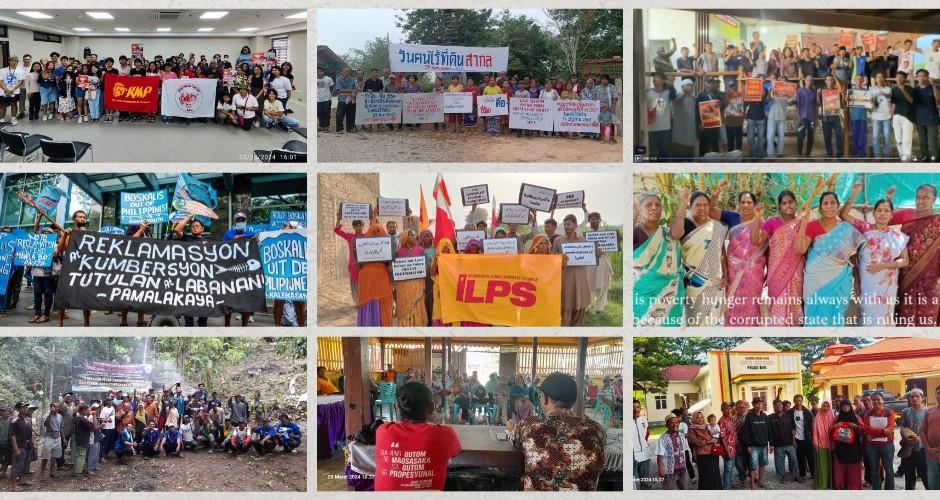Rural peoples’ organizations worldwide denounced land policies of the International Monetary Fund and World Bank that enabled corporate land grabs and resource plunder in a global speakout held 13 May 2024, the first day of the WB Land Conference 2024.
The “Global Speakout of the Landless!” featured the outcomes of the Landless Voices consultation series and solidarity messages from different organizations who are also rejecting the World Bank Land Conference and supporting people’s resistance to assert their right to land.
LANDLESS VOICES
The Landless Voices consultation series, which is a part of this year’s “Day of the Landless” campaign, held its first consultation on 12 April 2024 and its last consultation on 9 May 2024. The consultations focused on the following specific themes:
International Finance Institutions
Rodolfo Lahoy of IBON International discussed how the World Bank’s land governance policy facilitates private sector interventions. Land markets are created together with financial markets, which allow greater corporate and landlord encroachment of land and resources.
“Around the world, the World Bank along with the International Monetary Fund are imposing programmes and policies of land dispossession, as almost 1 billion people suffer from hunger,” Lahoy said.
Fueled by debt, increasing land dispossession has led to rural hunger, loss of livelihoods, and inaccessible social services, all of which are obstacles to food sovereignty and a violation of their rights.
Agricultural Workers
Agricultural workers are among the most exploited and oppressed sectors, bearing meager wages and the worst working conditions. According to the report of Triana Kurnia Wardani of SERUNI in Indonesia, agriworkers are working without pay and child labor is rampant in some countries. Unsafe working conditions including extreme heat and exposure to toxic agrochemicals are also making agricultural work deadly.
“Agricultural workers bear the weight of the world’s supply chain, yet they are subjected to modern day slavery and unimaginable oppression and exploitation,” said Wardani.
Imperialist-backed Wars, Aggression, and Occupation
Behind the rising number of bombings targeting rural communities is the interest to grab their lands and plunder their resources. These bombings disrupt daily life and violate human rights of these communities.
“Many of these landgrabs are imperialist-backed large-scale investments, funded by international finance institutions like the IMF-WB. Governments protect these projects through militarizing affected communities,” Gail Orduña of PCFS said.
Land and Resistance
Sri Lanka’s Natasha Van Hoff from the People’s Alliance for Right to Learn (PARL) shared the growing resistance of rural people’s movements in asserting their right to land despite attacks and political repression, on top of the economic impacts of these landgrabs.
They successfully launch campaigns to voice out their legitimate demands, collaborate with various groups and individuals, document violence perpetrated against their communities, and maximize all available legal instruments to defend their rights and civil liberties.
Indigenous Peoples
People in power deem indigenous knowledge, culture, and practices as “unfit” for their so-called “developed” world, said Paul Belisario from the International Indigenous Peoples Movement for Self Determination and Liberation (IPMSDL). Indigenous peoples face judicial harassment, criminalization, and false charges as they fight against attempts to drive them out of their ancestral lands. However, these IP communities continue to be at the forefront of struggle for right to land and self-determination.
SHUT DOWN IMF-WB
The sharing of these results was followed by solidarity messages from different organizations and movements from across the globe. They spoke about their local situations and their assertion of the people’s right to land, and called to shut down the IMF-WB.
These organizations were the Zambia Social Forum, Single Mothers Association of Kenya (SMAK), Arab Group for the Protection of Nature (APN), AMIHAN – National Federation of Peasant Women, Vikas Adhyayan Kendra, Kilusang Magbubukid ng Pilipinas (KMP), Migrante Taiwan, ESAFF Uganda, Front Mahasiswa Nasional Pimpinan Pusat, Asian Peasant Coalition (APC), and Sojhla for Social Change.
The messages called out harmful policies of the World Bank and the different issues that rural people face such as landgrabs, workers’ exploitation, oppression of the people, disruption of daily lives, and the loss of food sovereignty.
At the end of the program, Rafael “Ka Paeng” Mariano from the Commission 6 of the International League of Peoples’ Struggle (ILPS) and Kilusang Magbubukid ng Pilipinas (KMP) provided a synthesis of the topics discussed in the webinar and recommendations, stating that “there is a big challenge for us, not only to continue, but to further strengthen and intensify the people’s resistance against the World Bank’s anti-people policies.” Additionally, he also mentioned the need to advance our campaigns and activities on different crises caused by neoliberal policies, and that we have to protect and defend the peasants’ democratic rights and fundamental freedoms.
“We have to hold the World Bank accountable for the worsening crisis brought about by its neoliberal policies,” said Mariano. He called the further strengthening of the people’s movement – primarily, the movement of landless peasants including rural women, peasant women, women agricultural workers and farm workers, and also Indigenous Peoples defending their ancestral lands from imperialist plunder and exploitation. ###
Written by AJ, PCFS intern.



